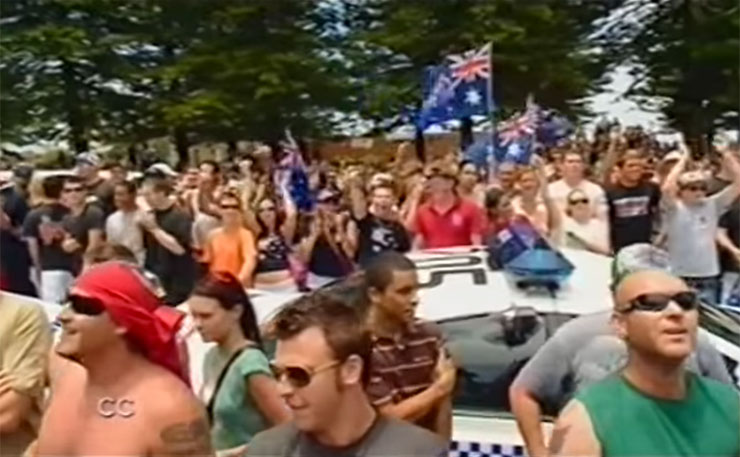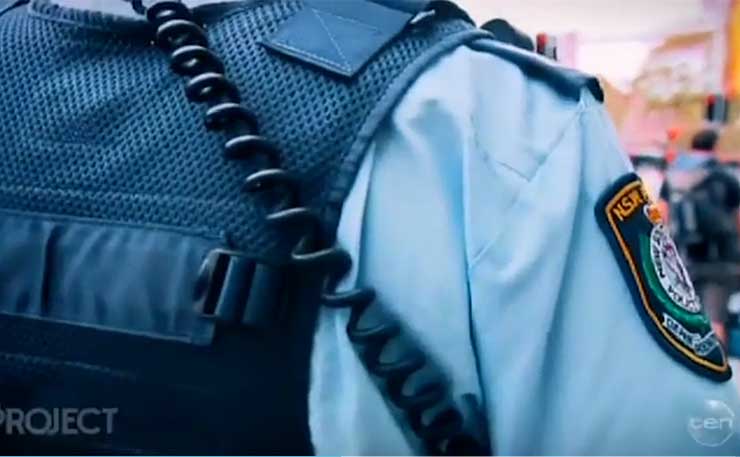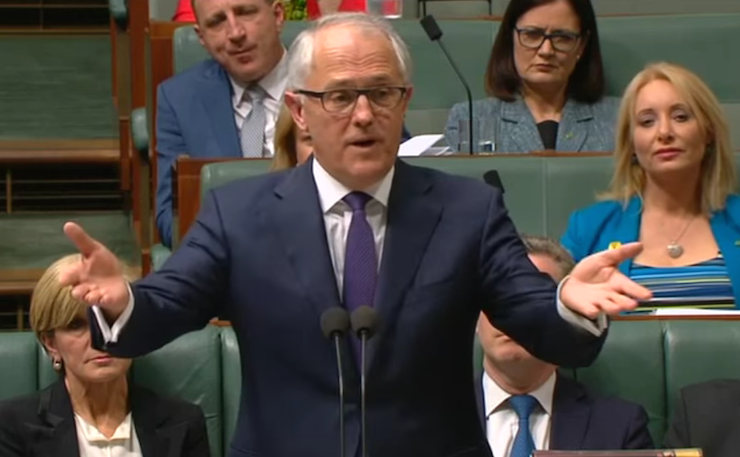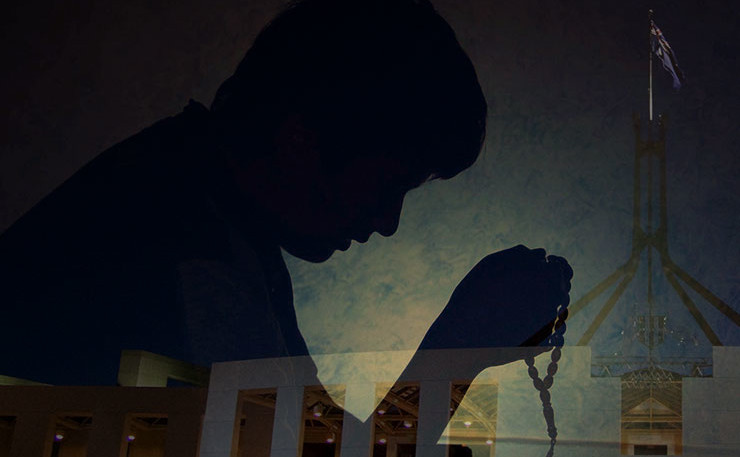If you can’t understand why so many Muslim Australians have so little trust in the government, then you probably haven’t been following the news. Or Parliament. Or… Michael Brull breaks it down for you.
In this article, I want to discuss how the state in Australia relates to Muslims. Whilst Islamophobia is thought of as particular bigots saying mean things – like Pauline Hanson – it is often not considered as institutionalised oppression. The fact that the relationship between Muslims and the state has been basically poisoned is occasionally conceded in the media, but the significance of this fact is never really analysed or drawn out.
In the past week, there have been a few articles which I think give an idea of some parts of the dynamic which I want to illustrate.
One article concerns a section of the New South Wales Police Force in Sydney, called the Middle Eastern Organised Crime Squad (MEOCS). Deborah Snow and Lucy Cormack give a brief history of its foundation.
It was originally called Task Force Gain in 2003, supposedly run in response to shootings in south-west Sydney by “criminals of Middle Eastern background”. Within a year they had made over a thousand arrests and over two thousand charges, “mostly linked to drugs and firearms offences”. Snow and Cormack do not mention the ugly background of anti-Lebanese Muslim demonisation, particularly in relation to the gang rapes.
In 2005 came the Cronulla race riots. Then Liberal opposition leader, Peter Debnam said if he became premier he would round up “200 Middle Eastern thugs”.

Though Snow and Cormack claim Task Force Gain was founded because of shootings in 2003, they don’t explain why it so seamlessly rebranded as the Middle Eastern Organised Crime Squad, rather than simply being disbanded.
Notably, they consider the racially-focused squad successful and effective. Nevertheless, they note that government officials hope the rebranding will improve community relations. MEOCS won’t actually be disbanded – it will simply merge with other police groups. The same people who have built their careers policing people from Middle Eastern backgrounds will still be there, without any kind of institutional change.
A “winner from the reshuffle” is Dave Hudson, Deputy Commissioner for Investigations and Counter Terrorism. He thinks there was a strong rationale for the MEOCS brand name, and continued to defend it. “With Middle Eastern community leaders, I’ve always said we were not targeting their communities, we’re targeting Middle Eastern criminals”. But, “If the community leaders are happy, if they’ve got some benefit out of us moving in that direction, that’s a good thing.”
Police in Australia have always been a fundamentally racist institution. In 1990, they were proudly defending the need to police Aboriginal people in particular. When they were asked to justify the infamous Redfern raids, the Executive Chief Superintendent explained that ordinary policing wouldn’t work in Aboriginal communities. After all, “You stand out like you know what… where do you survey the activity of people when they are all the one breed? So you’ve then got to look at alternative methods and that was what today was all about.”
Now, one of Mr Hudson’s primary institutional responsibilities is apparently counter-terrorism. He still considers it legitimate for police to institutionally focus on people from Middle Eastern backgrounds. Even now, his concern doesn’t seem to be how people from Middle Eastern backgrounds feel about being targeted by the police. Rather, he expresses interest solely in how “community leaders” relate to MEOCS. Apparently uninterested in the views of the population he is targeting, he hopes to win the acquiescence of a thin layer of “leaders”, who in turn are expected to sell racialised policing to the affected communities.
Insofar as any of those “community leaders” serve that function, they will not be considered leaders, but merely loyal servants of the police. There are presumably inducements offered to “leaders” who fulfil their assigned roles, and punishments for those that don’t. Thus, the police establish a manipulative and intrusive relationship with Muslim communities, artificially elevating figures who are appropriately servile.

Muslim youths who beat the brunt of racialised policing can be expected to become particularly alienated not just from the police, but from the newly elevated leaders who have made peace with racialised policing.
A second story of the state and Muslims comes from the ABC. The government has adopted a theory that the way to counter terrorism is to call it “countering violent extremism”. This sounds like a relatively non-Muslim targeting theory. It gained public notoriety when a government paper suggested that ‘environmentalist Karen’ could become a violent extremist.
This outcry stemmed from the accurate concern that the government watching over “radicals” could have a chilling effect on legitimate freedom of speech. The fact that this approach is applied to Muslims didn’t lead to the same outcry.
Countering violent extremism, the intellectual and academic side of counter-terrorism, is a lucrative field. Thus, the British firm Bell Pottinger was selected by the Attorney-General’s department to sit on a “countering violent extremism research panel” for four years.
Others selected included “think tanks, companies and universities that could inform deradicalisation programs”. It is not clear if Bell Pottinger got any work out of it, but they were listed “as an appropriate source of advice for all Government agencies”.
Bell Pottinger is notorious for allegedly inciting racial hatred in South Africa, and supporting the government of Bashar al-Assad in Syria. ABC’s Henry Belot reported that they were also “reportedly contracted by the US Government to run a propaganda and disinformation campaign in Iraq, spreading videos that appeared to be made by Al Qaeda”. That is, a company that supported both the war in Iraq and the government in Syria were the kind of people the government turned to insights on countering extremism among Muslims in Australia.
Academic Clarke Jones observed: “I am not sure whether the Government fully understands the negative ramifications of their current countering-violent extremism approaches.”
The final story is this. In 2015, the government committed to setting up a $3.9 million helpline to counter “radicalisation”, in response to the murder of NSW Police Service accountant Curtis Cheng. This was part of a broader $47 million commitment to CVE.
The phone line is staffed from 7 am to 9pm every day, every week. Launched by the Minister for Counter Terrorism in June, people are meant to call in to report concerns about friends or family who may be at risk of violent extremism.
They have received five calls in two months.
The ABC’s James Thomas reported a source told him: “It costs millions, but only a few people have called it. One call was a wrong number, the other was a parent worried their kid was dating a Muslim.”
“Counter-terrorism expert and director of Intelligent Risks Neil Fergus said: ‘To be frank, the most effective tools that we have within Australia, in terms of community engagement, are the personal contacts being made by ASIO officers and police officers.’”

To understand what it would mean for friends and family to report their loved ones to counter-terrorism police, it is worth remembering just how extreme and draconian our laws are. For example, the legislation criminalises a person possessing a “thing” which is “connected” with the “preparation” of a terrorist act. It doesn’t need to refer to any specific terrorist act – and “terrorist act” is defined very broadly, including threats.
‘Crimes’ that people have been charged with under this legislation include conducting internet searches, and creating an electronic memo. The penalty for these acts is up to 15 years imprisonment.
If that’s not broad enough, any act in preparation for a terrorist act – one that doesn’t occur, and not in reference to any specific terrorist act – can result in life imprisonment.
If you didn’t know what your friend – or cousin, or nephew – was up to, would you risk them going to jail for the rest of their life for a few internet searches? Or because they said something that could be construed as a threat? Would you trust the government’s de-radicalisation program, knowing that the police had convinced someone in one of those programs to get sufficiently involved in a terrorist plot to send them to prison?
Put aside the predictable failure of the government’s counter-terrorism program to build any meaningful links with Muslim communities. The attempts to build a network of snitches can only further tear at the fabric of the community. This isn’t hard to understand in other communities.
For example, in Maoist China, the government encouraged people to report on counter-revolutionary family members. Children reported their parents. For many of us, it is hard to imagine the climate of fear and suspicion sowed by a pervasive sense that it wasn’t safe to talk freely anywhere, not even in your own home.
That is the climate the Australian government is creating for Muslims. The police targeted them with their own section of the police – which now doesn’t formally exist in Sydney, though it wasn’t actually disbanded. The government watches Muslims, and urges Muslims to snitch on each other, having created extremely harsh “terrorist” offences that everyone knows are targeted at Muslims.
The government’s “experts” on Muslims include experts in propaganda, like Bell Pottinger, who support Assad and the occupation of Iraq.
And somehow, for some reason, Muslims don’t trust the state.
Donate To New Matilda
New Matilda is a small, independent media outlet. We survive through reader contributions, and never losing a lawsuit. If you got something from this article, giving something back helps us to continue speaking truth to power. Every little bit counts.






